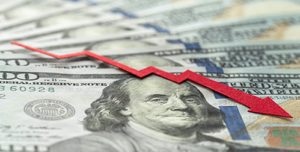- Inflation and sanctions are speeding up the process of “dedollarization” around the world
- Russia and China are taking steps to eliminate the supremacy of the US Dollar
- Central banks and investors are moving towards gold and away from the Dollar
Dedollarization Speeds Up
The US dollar hit record highs last month. The greenback’s gains have been fueled by a combination of higher central bank interest rates, haven buying, and recession concerns. But this may be the dollar’s last gasp. Dollar supremacy could be coming to an end. Changing global conditions are speeding up the process known as “dedollarization”.
Dedollarization is the process of other countries moving away from using American dollars. The American dollar became the supreme currency after World War 2. It became the basis for rebuilding the global economy. In the process, the dollar cemented the United States’ superpower role.
But the state of the world has changed dramatically since World War 2. Countries are rejecting the primacy of the American dollar. And this does not bode well for the American economy.
Russia and China started real dedollarization after 2014. Russia had annexed Crimea and was sanctioned by the West. Russia turned to China. They started trading in the yuan to sidestep the sanctions. China was then pushed closer to Russia after the US imposed billions in tariffs on Chinese goods.
The US turned their currency into a weapon and wound up cutting themselves. China and Russia have since cut their use of the dollar for trade in half. Before 2015, 90% of trade was in dollars. Now, it is at 46%. They moved from the dollar to using their own currencies – rubles and yuan.1

Sanction’s Unintended Consequences
Sanctions made Russia’s access to their foreign reserves of US dollar inaccessible. So, they accumulated Chinese yuan as a reserve currency instead. They now own one quarter of the world’s yuan reserves. Russia has also allowed the purchase of Chinese bonds. In addition, Russia is making bilateral deals around the world that are based in rubles instead of dollars.
Jeffery Frankel is an economist at Harvard University. He warned that while the dollar’s position is secure for now, spiraling debts and an overly aggressive sanctions policy could erode its supremacy in the long run.
“Sanctions are a very powerful instrument for the United States, but like any tool, you run the risk that others will start looking for alternatives if you overdo them,” he said. “I think it would be foolish to assume that it’s written in stone that the dollar will forever be unchallenged as the number one international currency.”2
China Asserts Its Currency
The Chinese government is strategizing how to avoid the sanctions that hit Russia. They are thinking about dumping their US dollar reserves preemptively. China has world’s largest US dollar reserves at $3.2 trillion. If they drop their dollars, it’s the beginning of end of the dollar as the world’s reserve currency.
And it’s not just China and Russia that are getting rid of their US dollar reserves. The IMF said central banks today are not holding the greenback as reserves in the same quantities as yesteryear. “The dollar’s share of global foreign-exchange reserves fell below 59 percent in the final quarter of last year, extending a two-decade decline.”3
China is also shedding the amount of US debt they buy. The US props up its currency by issuing government debt to other nations to finance its deficit. China rescued the US during the 2008 global financial crisis by purchasing enormous quantities of US Treasury bills. As of last month, China had cut the amount of debt they owned in half. If China stops buying debt, the United States government might not be able to continue functioning. The value of the dollar would plummet, and taxes would soar.
Most alarming is the potential move away from the petrodollar. The US dollar is powerful because, in part, it is the de facto currency for oil sales. That got shaken when China and Saudi Arabia started talking about using the yuan to buy oil. China is the biggest buyer of Saudi oil. Doing so would undermine the power the petrodollar gives the United States.
What’s does this all hold for the future of the US economy? Dedollarization would show a loss of confidence in the US currency as a safe haven. The value of the dollar could drop drastically. Americans could expect inflation, recession, and wild stock volatility. Retirement funds could be wiped out. The US will lose its status as the sole superpower.
As the dollar drops, investors will seek safety in alternative assets, such as gold and other currencies. A survey published in June by the World Gold Council found that 80 percent of the central banks expect to expand their gold reserves within the next year. The survey said central banks are now less confident in the role of the US dollar as a global reserve currency.4
If you want to protect your wealth like the central banks, then you should consider the Gold IRA from American Hartford Gold. It is designed to shield your retirement funds from the effects of dedollarization. Contact us today to learn more at 800-462-0071





